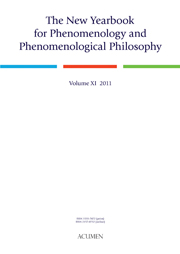Retrieving Husserl's Phenomenology: Hopkins on Philosophy's Last Stand
from In Review
Summary
Abstract: Burt Hopkins provides a reading of the development of Husserl's phenomenology, framing it with an account of its relation to Platonic and Aristotelian theories of unity-in-multiplicity, on the one hand, and the criticisms of Husserl found in Heidegger and Derrida, on the other. Here I introduce a further approach to the problem of unity-in-multiplicity – one based on normative ideality, drawing on Plato's Idea of the Good — and investigate three crucial aspects of phenomenological philosophy as Hopkins presents it: the method of reflection, the nature of absolute consciousness, and the status of the ego. I take issue with Husserl's idea that consciousness can be the sufficient ground of that “meaning” which, for both Hopkins and for me, is the specific topic of phenomenology.
Keywords: Burt Hopkins; Edmund Husserl; Martin Heidegger; ego; meaning; reflection; passive synthesis; phenomenology.
Burt Hopkins's penetrating and challenging book, The Philosophy of Husserl, is an “introduction” to Husserl's thought in the way that Husserl's Ideas I or Cartesian Meditations is an introduction to phenomenology: it gives us an expert and wide-ranging account of the thought in question by going deeply into its inner meaning and touching on its most delicate and problem-filled nuances, taking up very particular problems in some detail and arguing (sometimes explicitly, sometimes only implicitly) with philosophical positions that are at odds with the one being presented.
- Type
- Chapter
- Information
- The New Yearbook for Phenomenology and Phenomenological PhilosophyVolume XI 2011, pp. 297 - 312Publisher: Acumen PublishingPrint publication year: 2012



